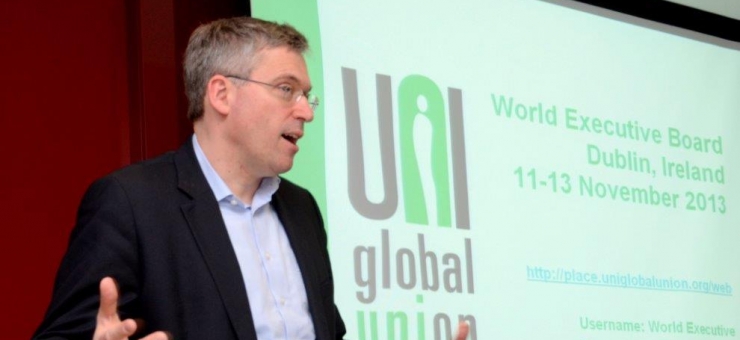UNI Europa reports on regional and global labour and trade union challenges

At the UNI Global Union World Executive Board meeting in Dublin, Oliver Roethig, UNI Europa Regional Secretary, reported on regional developments and upcoming challenges for the labour movement.
"We thought that the Troika was not our concern. We were wrong! The EU Commission and EU leaders have adopted a Troika vision of the world and are trying to dismantle fundamental rights such as the autonomy of social partners to engage in collective bargaining and social dialogue that we fought hard to obtain. We must respect the autonomy of social partners and strengthen social dialogue processes to restore social Europe to its true meaning."
We hear that Europe is continuing business as usual until the recovery. This is no longer the case for social Europe. Both the EU Commission and Member States tell us that we are no longer important. On 02 October, the Commission published its REFIT Communication anxious to cut ever more of what it considers to be red tape. On top of its hit-list is labour and social legislation. The Commission is backing down and even prevents further developments in the sense of how we, the labour movement, understand social Europe.
The Hairdressing Social Partner Agreement is used as a scapegoat and its further implementation is blocked. The Hairdressing agreement has become a European Social Dialogue test-case. UNI Europa will fight both politically and legally to ensure that the fundamental rights of Trade Unions are fully respected.
The EU and the prevailing Troika ideology in Europe perceive sectoral collective agreements as unhelpful and prefer instead to push for company-level agreements with all the ensuing dire consequences for workers and trade unions. Roethig said: “There is an attempt to weaken trade unions and depict them as part of the problem and not the solution. The EU is clearly attacking fundamental social rights and social Europe.”
The ETUC has adopted an Investment Plan for Europe which plans for (2% of GDP to be spent for a real growth policy over the next 10 years. In view of the upcoming European elections, and to avoid the significant rise of extreme parties, we need a revamped European Social Model. The Investment Plan for Europe is well founded. It is a joint initiative of all European Trade Union Federations. We are asking for a new extra levy on the rich to invest for deleveraging workers' losses. We envisage a fairer and just society with decent working conditions and quality jobs.
The EU has taken an anti Trade Union and anti-democratic stance. We will fight at national and European levels not only for the workers we represent but to send a clear message to the world: Trade unions, worker's rights and fundamental social rights must be strengthened worldwide. Roethig stated: “We will not stand idly by in the face of such an unprecedented attack on the core of the European Social Model that we helped shape.”
We are facing a real and dangerous challenge in Europe. The European Union is unfortunately convinced that labour and trade union rights must be rolled back in order to disassemble social Europe’s achievements thus far. The fight in defence of social Europe has become global, as other regions look toawards Europe.
The European Union pushes for ever closer national economic coordination through the new process of Economic Governance. This recently engaged process effectively translates into austerity policies, very high unemployment, and making life difficult for the unions.
UNI Europa fights to stop the imposition of a neo-liberal agenda that imposes structural reforms as the only alternative. Negative effects and dire consequences of this agenda are mapped out in the ‘Chamber of Horrors of EU Economic Governance’, recently adopted by the UNI Europa Executive Committee meeting.
Ongoing negotiations on the Free Trade Agreement with the USA place the services industry centre stage as the neo-liberal agenda would like to impose further liberalisation in the trade of services with worrying consequences for workers and unions on both sides of the Atlantic.
The European Commission drags Social Europe backwards, chipping away at union rights and questioning the fundamental role of trade unions as co-legislators.
Oliver Roethig reported on sectoral developments: “UNI Europa Finance is making everything possible to avoid bankers and speculators running away with the money. We are fighting to reclaim the money to serve the real economy and the workers. In face of the brutal closure of the public broadcaster, ERT, in Greece, POSPERT received in expression of solidarity, the Free from Fear Award of UNI Global Union. UNI Europa Commerce has actively engaged to stop the ever-increasing pressure to apply anti-workers and anti-union measures in the search of retail competitiveness. UNI Europa Post and Logistics, gathers examples of failed postal liberalisation processes to convince governments to change course.”
Reporting on cross-sectoral matters, Oliver Roethig mentioned the significant effort of UNI Europa in setting out a vision for the services industry encompassing services sectors employing skilled staff in decent and inclusive jobs: the Services Manifesto. The Manifesto will also be used to raise awareness on our demands for services sectors in view of the upcoming European elections and serve as a basis for a comprehensive research process for the services industry in the years to come.
Roethig said: “UNI Europa prioritises the setting up of Trade Union Alliances in multinational companies. In order to strengthen and organise trade union power at the European and global levels, we need trade union alliances and enhanced cooperation through European Works Councils. Europe must capitalise on the comparatively positive situation of established trade union power and institutionalised collective bargaining structures. This positive situation must be used to limit membership decline.”
UNI Global Union General Secretary, Philip Jennings said: “Services represent added value in terms of jobs but indeed there is no coherent policy over the services industry globally. The Services Manifesto is a first step in our efforts to coordinate and set out a global vision for the services industry.

